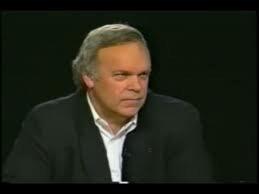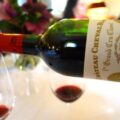Now that Robert Parker California Wine Reviews cease to exist as he stops reviewing California Wine, what happens next? That is the million dollar question being asked by winemakers, merchants and collectors.
In a stunning development announced in The Wine Cellar Insider Saturday, February 5, after more than 4 years of writing for The Wine Advocate, Antonio Galloni took over the responsibility of reviewing California wines from Robert Parker. Bob will continue covering Bordeaux wine, wines from the Rhone valley and older vintages of California wines. www.thewinecellarinsider.com/?p=12458
According to Robert Parker, this will allow him to add a third trip to Bordeaux each year, awarding him the time to focus on tasting and reviewing older vintages of Bordeaux wine from both The Right Bank and The Left Bank.
It’s interesting to note, Bob is leaving on a high note for California wine. Bob described 2007 as “a reference point” vintage for Cabernet Sauvignon. 2008 appears to be a mixed year.
Is The Wine Advocate for sale?
Without Robert Parker, what happens with the California wine market?
Retailers with 2007 should be able to sell everything that received good scores from Bob. That’s current vintage. Collectors hunger for something new to place in their cellars. Merchants holding back stocks of California wine could have reason to worry. Without Parker’s enthusiastic prose, it’s possible consumers will lose interest in paying record sums for high-end California wines. If collectors lose interest in current vintages, they could stop seeking back vintages, which would depress the market. Wineries that earned high scores in the past could be afraid. High prices are supported by high scores and demand. If their wines don’t continue earning similar scores, consumers will stop paying high prices and the wines will fall out of favor. Things change faster than we realize. Remember the 80’s? Many of the most collectible wines from that decade are no longer in favor. Grace Family, Mayacamas, Caymus, Stags Leap, Heitz, Montebello, Diamond Creek and other wineries that were on the tip of everyone’s tongue, do not hold the same fascination for most wine consumers today.
Was Parker good for the development of California wines?
Robert Parker was the best thing to happen to California wine. Not only are the wines being produced in the Golden State better than ever, there are more producers making better wine in a wider variety of styles than at any time in the history of California wine. Of course a small number of outstanding wines were produced in California in the 50’s, 60’s 70’s, and 80’s. Recent tastings of Charles Krug from the 40’s and 50’s proved California produces wines that age and evolve. But when you think about it, how many great producers were making stellar wines before Parker? My opinion is, on a sheer numbers basis, there are more wineries making better wine today, from wider diversities of terroir, than at any time in the history of California. This is not to say we like all the wines that received high scores. We don’t. Some of the wines have felt hot, jammy and over oaked. But it’s wrong to judge multiple regions based on a few wines. Other wines have offered intense flavors, sensuous textures and purity. It’s about the individual wine and the taster.
Does all the credit for the regions success belong to Robert Parker? Of course not. It all started in the early 1970’s, thanks to Parducci. It was their 1970 Cabernet Sauvignon that sold for a whopping $4 that inspired Bob to dedicate the next 4 decades to discovering what California had to offer. His constant, enthusiastic championing of the region kept it front and center, allowing it to grow, develop and find a marketplace. According to Parker, his biggest contribution to the success of California wines was in pushing wineries towards making more wines from single vineyard sources.
Today, many of the California wines earning high scores are produced from ripe fruit in a rich, opulent, forward style. That is not the only style of wine being produced. A myriad of wines with higher acidity and lower alcohol levels are being made all over the state. Just because some styles of wine don’t earn high scores, does not mean they are not being made.
It’s fashionable for some people to claim Robert Parker or other critics dictate taste. I don’t see it that way. Consumers make up their minds after tasting a wine. People make those comments because others enjoy wines in a style they do not find value in. It is a misconception to think consumers that prefer some types of wine are sheep, while others who don’t like that wine are the only people with taste. Everyone can and does decide if they like a wine, or not, all on their own. Critics can lead people to a wine, but even Robert Parker cannot make them like it.
Where does Antonio Galloni fit in and what California wines will he recommend?
Nobody knows how Galloni will look at California wine, But that doesn’t stop posters and wine lovers from discussing the issue. Why should it? It’s interesting to speculate. Across the Internet, people have been writing with glee: “Antonio won’t like the same wines Bob did.” “This is the end of 100 Pt wines.” “The death knell for wineries that previously earned high scores from Parker.”
Others are convinced of the same results. But they are not shouting with joy. They are bemoaning the fact that their favorite wineries, which are known for producing rich, ripe, high alcohol, hedonistic styles will no longer be making wine in the same style that made them famous. Some people contend wineries will change course and begin making wines in styles Galloni will favor.
Posters on Robert Parker’s website asked Antonio about this issue. He candidly responded writing, “I know people are worried about what my views might be, so let me share some of the tastings that have been most memorable. One was with Bart Araujo and his team, where I had the opportunity taste a number of wines in barrel, and then bottle. I also had a great tasting with Thomas Rivers Brown at Outpost, where we went through a number of Thomas’ clients’ wines from barrel, and finished with a Rivers Marie Pinot I thought was stunning. A few years back I moderated a seminar at the Jackson Hole Wine Auction with wines from Harlan, Shafer and Pride, which all showed great. I am convinced there are a number of great, yet still unknown stories unfolding in CA, and I look forward to writing about them.”
Is that enough information for subscribers to get an idea of what Galloni thinks about California wines? Or is there more? Thanks to 4 years of writing for The Wine Advocate, and from notes Antonio published in his journal, “The Piedmont Report” prior to joining Parker, readers are familiar with his ability as a taster. Are his past efforts an indicator of what California wines Galloni will prefer? California is a different wine region than Italy. Or is it? That depends on who you ask.
The wines of Tuscany, known as super Tuscans are produced from Bordeaux varietals. Some of those wines are viewed as ripe and over the top by tasters with a more traditional palate. If that’s the case, (please note, this is a question, not an answer,) perhaps a look at some of the wines that recently earned high Galloni scores will guide people as to what they could expect from California wine reviews from Antonio.
2007 Tignanello 95 Pts
2007 Solaia 97 Pts
2007 Masseto 96 Pts
2007 Galatrona 95+ Pts
2007 San Giusto A Rentennano La Ricolma 96 Pts
2007 Sassicaia 95 Pts
2007 Tua Rita Redigaffi 95 Pts
2007 Tua Rita Syrah 96 Pts
It’s too early to know what mark Galloni will make on California wine and The Wine Advocate. But it will be fun watching. Antonio has a large pair of shoes to fill. We wish him the best of luck.
If you have comments on this article, or any of the issues raised in it, please feel free to post and share your views.





16 Comments
Hi Christine
Thank you for the nice post. You can search through almost 2,500 different tasting notes and revews by clicking on the Bordeaux wine and other wine reviews icons in the navigation bar.
http://www.thewinecellarinsider.com/tasting-notes/
Informative post, thank you. I work on PR for Charles Krug, so was especially intrigued by your comments about the older vintages of Charles Krug wines and how well they age and evolve. Those wines from the 40’s and 50’s are rare–would you share your tasting notes?
Eric… Before we agree on if my response negates your opinion or not, what is the important point you are trying to make? In case you forgot, the key point I am trying to impart is, consumers make up their own on what wines they lie, or not by tasting a wine. Do you feel people think for themselves or not?
.
We can discuss this issue here if you like, which allows you and I to edit our typos.
http://thewinecellarinsider.com/forums_new/forumdisplay.php?5-Wine-amp-Food-Talk
By the way, last night was fun. 18 Piercing’s… Very impressive!!!
Do I feel people make up their minds about a wine solely by tasting with no affect given by label, critics or circumstance? No. And only an sheltered idiot (or some one with an agenda) would think otherwise…
Eric… This might not come as a surprise. But I do not agree. However, why not agree to disagree on this one.
How were the wines on Friday?
The ’88 Latour at Saam’s? Elegant, nice but restrained. Wasn’t as impressed with the wines by the glass however…
Elegant, but restrained is a fair description of 88 Chateau Latour. I find many of the 88 Left Bank Bordeaux wines to be showing some green flavors.
Eric… I am impressed. You started off with a compliment! Are you feeling well?
A good critic excites their readers about a wine. That enthusiasm carries forward and gets people to buy and try a wine. I get that. But I think that’s as far as it goes.
.
There are countless examples of high scoring wines that people do not like from every wine region.
.
Take all the high scoring Aussie wines that have fallen out of favor as an example. Consumers have voted with their palate and determined they do not like those wines. That is only wine region. The same thing can be said about many Spanish wines, Rhone wines, California wine and even Bordeaux wine.
.
If people do not taste and decide on their own if they like a wine or not, how do you account for consumers rejecting high scoring wines?
Typical of you Jeff to use weak arguments. The fact that there are plenty of high scoring wines that people do not like in no way negates my point unless you imagined that I was making an absolutist claim like “high scores ALWAYS affect one’s perception of a wine to the exclusion of all other factors” (which would be a “straw man” argument; i.e. pretending some one is making an obviously false claim so you can tear it down). I have never implied that actual taste plays no or even a small part of a wine’s perceived value. I would readily admit it most likely plays a major, if not dominant, factor. But even if a critic’s score has only a 10-40% affect, that is still very signficant (the range can be due to different types of people, history, trends, etc).
It is easy to argue that from the abundance of blind wine tastings where most people preferred lower scoring non-french wines over the much higher scoring premium Bordeaux, it is clear that people DON’T just value what they taste (and that one explanation on why those wines get such a premium is critic scores). Though history, scarcity and other factors can explain some of this disparity, it is pretty clear that critical scores are a major factor. Any socializing with wine enthusiasts reveals a significant amount of label whoring. Wine stores post critical scores in their stores because it works (and not just to sell the wine but also helping influence people’s appreciation of it).
So how do I account for “consumers rejecting high scoring wine”? The same way I account for consumers seeing a movie that critics praise. Does that mean important movie critics have no affect on attendance? No, but it clearly doesn’t mean they have no affect either.
Edit note: Substitute “pan” for “praise”.
Whoops! Strike that. Substitute:
The same way I account for consumers avoiding a movie that critics praise. Does that mean important movie critics’ praise never has an effect on attendance. No.
And, of course, this is where Jeff makes fun of my continual editing (because I can’t hide mine but he can his) to draw attention away from the fact that he was so clearly wrong. 🙂
Mr. Leve, I forgot to mention, I also liked the article. You summed up a lot of points in one post.
Ben… Thanks for the nice compliment.
LEC, You mentioned blind tasting. Have you ever not liked a wine tasted blind, but after learning about the big score, changed your mind? And on the other side of the coin, have you ever liked a wine tasted blind, but upon finding out the wine got a bad mark, did you later change your mind?
@Ben:
I pulled a famous trick decades ago on my dad’s wine group where I had switched the contents of a Greek wine with a bottle of ’86 Mouton Rothschild. It was April 1st so everyone brought their wines blind (in a bag). At first, their palates were quite good. The Mouton (in the Greek bottle) was cited to be a very good Bordeaux. When they pulled it out of the bag and saw the Greek label, some were astonished while the rest wrote the name down, vowing to buy such a great “deal”. But, eventually and after seeing the label, some began to carp how it was beginning to show its “true breeding” and was “breaking down in the glass”. Their comments on the Greek wine were probably reasonably critical, but when one of the guys pulled the bottle (saying Mouton) out of the bag he was so embarrassed he wouldn’t even admit to the others what it was. Everyone was shocked, but, after a few minutes, comments like “taste it now, it’s improving in the glass” and “it just needed more time to open up” began to pop up. When one guy commented that at first it was almost like I had switched the bottles I figured the game was up but even he really didn’t suspect (despite it being April Fools day). That day, it proved to me (and these VERY experienced wine tasters who had met every Saturday to taste wine for 40+ years!) that labels and such can have a very strong affect on how people perceive a wine. I have held blind wine tasting dinner parties every Monday/Tuesday of the year for the past 15 years and this observation has only been strengthened. Though this discovery may puncture some idealistic view of wine tasting, it really should fit in rather nicely with any person who’s view is reasonably sophisticated on the subject of marketing.
Nice article. But I disagree with your pat observation about how wine critics can’t “make” a person like a wine. Though in the sense that they can’t “force” a person to like any particular wine, your statement is obviously true, but if interpreted as that critics can’t significantly affect whether a person likes/enjoys a wine it is clearly false. Many things, beyond just taste, can affect a person’s enjoyment of a particular wine; from the wine label to the personal history one has with its producer (people always seem to enjoy wines they taste at the winery more than they do tasting the same wines at a wine store, for example). And if my years of throwing blind wine tastings has proven anything it’s that knowing what a famed critic (like Parker) says about a wine can definitely affect a person’s enjoyment of that wine (especially an enthusiast’s). It’s not even a question, but really more of a question of “how much” (can it affect one’s opinion of a wine).
Don’t make me pull out all my personal examples involving you which you’ll be forced to censor. 🙂
PS You missed a “that” here: “Nobody knows how Galloni will look at California wine, But XXXX doesn’t stop posters and wine…”